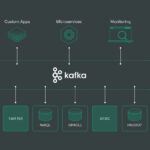In the realm of Big Data, the storage and management of vast amounts of data are paramount for organizations striving to extract valuable insights and make informed decisions. Hybrid cloud storage has emerged as a powerful solution, offering the best of both worlds by combining the flexibility and scalability of the cloud with the security and control of on-premises infrastructure. This hybrid approach enables businesses to leverage the benefits of cloud storage while maintaining critical data on-premises, striking a balance between cost efficiency and data security. In this article, we will delve into the significance of hybrid cloud storage in the context of Big Data, exploring its advantages, challenges, and best practices for effectively managing and storing large datasets in the era of data-driven decision-making.
Hybrid cloud storage is becoming increasingly relevant in today’s data-driven landscape. As organizations strive to improve their data management strategies, the combination of public and private cloud solutions offers unparalleled flexibility, scalability, and cost efficiency. This article delves into the nuances of hybrid cloud storage and its pivotal role in managing Big Data.
What is Hybrid Cloud Storage?
At its core, hybrid cloud storage merges the on-premises storage resources of a private cloud with the scalability and accessibility of a public cloud. This architecture allows organizations to store sensitive data on private cloud platforms while leveraging public cloud resources for extensive data analysis and storage needs.
This duality not only meets compliance and security requirements but also offers a pathway to harness the full potential of Big Data. With hybrid cloud storage, businesses can process massive volumes of structured and unstructured data without facing significant limitations associated with traditional storage methods.
The Importance of Hybrid Cloud Storage in Big Data Solutions
As organizations generate and handle vast amounts of data, the need for efficient data storage becomes paramount. Below are key reasons why hybrid cloud storage is crucial for Big Data solutions:
- Scalability: One major advantage of hybrid cloud storage is the ability to scale data storage according to demand. Businesses can allocate additional resources from the public cloud during peak periods while maintaining sensitive information securely on the private cloud.
- Cost Efficiency: Maintaining an extensive on-premises infrastructure can be prohibitively expensive. Hybrid cloud storage allows firms to minimize costs by storing less frequently accessed data in cheaper public cloud environments.
- Flexibility: Organizations can select a mix of cloud storage solutions that best fit their operational needs, providing the flexibility to adapt to changing business requirements.
- Data Sovereignty: With strict regulations around data privacy, hybrid cloud storage allows businesses to store sensitive data in their private cloud while offloading less critical information to public environments, ensuring compliance with legal requirements.
Key Features of Hybrid Cloud Storage
Understanding the features of hybrid cloud storage helps organizations make informed decisions when planning their Big Data strategies:
- Data Distribution: Hybrid cloud environments enable seamless data distribution between private and public clouds, allowing for efficient data movement and processing.
- Cloud Bursting: Office workloads can be adjusted by bursting into additional cloud resources when on-premises infrastructure reaches capacity. This capability is particularly vital during unforeseen spikes in data processing needs.
- Unified Management: Many hybrid cloud solutions come with unified management capabilities, thereby simplifying the administration of storage across diverse environments—public, private, and on-premises.
- Security Features: Security protocols such as encryption and specialized access controls are integral to hybrid cloud storage, ensuring sensitive data protection when transitioning between different cloud environments.
Challenges of Implementing Hybrid Cloud Storage
While the benefits of hybrid cloud storage are evident, organizations may encounter challenges:
- Complexity: Managing multiple cloud environments requires a sophisticated understanding of various architectures, making it complex to implement and maintain.
- Data Governance: Ensuring compliance with data governance policies is more complicated when data is spread across various storage environments.
- Integration: Integrating existing systems with new hybrid cloud solutions often poses significant challenges, necessitating a thoughtful approach to technology collaboration.
Use Cases of Hybrid Cloud Storage in Big Data
Several industries are harnessing hybrid cloud storage to facilitate Big Data initiatives:
1. Healthcare
In the healthcare sector, patient records and sensitive health information are often stored in private clouds to comply with regulations like HIPAA. Hybrid solutions enable healthcare organizations to analyze aggregated data from public clouds while maintaining patient privacy standards.
2. Retail
Retailers leverage hybrid cloud storage to accommodate sudden customer demand and seasonality. Through cloud bursting, businesses can dynamically adjust resources for big sales events, leveraging the public cloud for temporary capacity without incurring long-term costs.
3. Financial Services
Financial institutions frequently deal with sensitive customer data and benefit from the secure nature of private clouds while utilizing public cloud resources for analytics and reporting, enabling them to gain critical insights into market trends.
4. Government Agencies
Government entities are exploring hybrid cloud storage to enhance data management, ensuring secure storage and access to sensitive information while utilizing cloud services for analytical purposes.
Choosing the Right Hybrid Cloud Storage Solutions for Big Data
When selecting hybrid cloud storage solutions, organizations should consider the following factors:
- Data Security: Ensure the hybrid solution complies with security standards and offers encryption to keep data protected during transit and at rest.
- Performance: Analyze performance metrics to determine if the storage solution can handle the specific demands of your Big Data applications.
- Vendor Support: Look for vendors that provide robust support and training to help teams navigate the intricate hybrid cloud environment.
- Integration Capabilities: Ensure the chosen hybrid cloud solution can integrate seamlessly with existing infrastructure and applications.
Conclusion on Hybrid Cloud Storage and Big Data
While the article doesn’t offer a summary, it is clear that hybrid cloud storage plays an essential role in managing Big Data in today’s business environment. By offering the flexibility, scalability, and efficiency needed, hybrid cloud storage solutions allow organizations to store and analyze vast data sets securely and effectively. Embracing hybrid cloud storage is no longer a luxury but a necessity for businesses aiming to remain competitive in the increasingly data-centric world.
The adoption of hybrid cloud storage solutions is essential for effectively managing and analyzing Big Data. By combining the scalability and flexibility of the cloud with on-premise infrastructure, organizations can optimize storage, performance, and cost-efficiency to meet the demands of Big Data processing. Embracing hybrid cloud storage for Big Data is a strategic decision that can drive innovation, enhance competitiveness, and unlock the full potential of data insights for businesses in the digital age.














